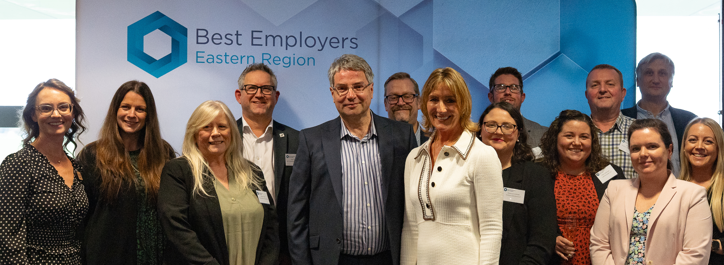Discover how to create thriving work environments for the future
 Since its launch in April, our team at Pure, along with co-founders’ eras and partners, Birketts and Archant, have been busy working with over 90 organisations to get the most out of their Best Employer 2021 programme. Through our co-founders, eras Ltd.’s employee engagement survey and an inspirational programme of webinars, our regions participating organisations are getting deep knowledge of their employee engagement levels, ideas for what they can do about it and how to create thriving working environments for the future.
Since its launch in April, our team at Pure, along with co-founders’ eras and partners, Birketts and Archant, have been busy working with over 90 organisations to get the most out of their Best Employer 2021 programme. Through our co-founders, eras Ltd.’s employee engagement survey and an inspirational programme of webinars, our regions participating organisations are getting deep knowledge of their employee engagement levels, ideas for what they can do about it and how to create thriving working environments for the future.
Since the inaugural programme in 2012, Best Employers has become part of Pure’s DNA. Even though recruitment is at our core, we are in the business of building relationships, working with our connections to help organisations make a difference for their employees.
We achieve this through a number of programmes that build knowledge of people, culture, recruitment, and leadership, preparing people for their careers and helping our region's organisations provide great places to work.
2021 Programme
Our Best Employer 2021 programme is significantly different from previous years, being delivered virtually and offering access to inspirational local and international speakers.
Over the past year, the most successful organisations have had to truly innovate and work that much harder to look after their people. Best Employers is the place to be inspired on employee engagement and gain some great tips and inspiration to keep your culture fresh.
Here’s an overview of the themes and ideas that our speakers have introduced to us, so far.
Best Employers launch event
International author and HR leader, Debra Corey, looked at the importance of unlocking the power of employee engagement. She explained, “Employee engagement is a two-way street. It's our responsibility to do what we can so our employees will unlock it themselves and start engaging with the organisation.”
“Our companies need more than just happy people,” she said. "They need people who are going to be driving the business. And to be honest, employees deserve more as well.”
Debra stated, “Companies with high levels of employee engagement, have higher levels of productivity, greater customer loyalty, 67% lower turnover of staff, 75% lower rates of absence and 41% lower rates of safety incidents.”
She explained that there are four parts to the employee engagement cycle. The first is for people to understand and believe in the direction of the company. The second is for them to know how their role contributes to that and the impact they have. The third part is for staff to genuinely want the company to succeed – and to be ready to find ways to make that happen.
British entrepreneur, Tamara Lohan of travel business Mr & Mrs Smith, shared her experience of leading a team through the pandemic. She said “Keeping the team happy and motivated through the pandemic has been challenging. In March 2020, as we saw the bookings drop off, we decided to get rid of every single office around the world and told everybody that we would never go back to an office again. So, we are fully distributed workforce forevermore.”
“Firstly, as a global business, we were already remote and distributed around the world. Secondly, I wanted to be able to hire people from around the world, especially in the tech team. It was becoming very competitive in London to employ engineers, so if we could have a broader base from which to employ from that would give us an advantage. Thirdly, it really does give work-life balance. There are things that you need to change in a virtual world, and you have to learn new ways of working, but it does mean that everybody can balance their life and live wherever they want.”
Tamara explained that she had a very polarised view about offices, “I actually believe that the companies who are doing this hybrid version are going to be stuck between the worst of all worlds. By forcing people to come into an office some of the time, you are not getting the advantages of being fully distributed and by having some core meetings in person and I think that's kind of just stuck between two spaces and I don't see how that's going to work longer term.”
Engaging and leading remote and onsite teams
At our second webinar on agile working, we were joined by Paolo Moscuzza, Partner at Cambridge based OE Cam who are business psychologists, and Catherine Hodds, Director of People and Culture at Saffron Housing.
OE Cam started exploring the concept of hybrid working throughout the past year as clients started to ask them about the concepts and pitfalls of adopting a hybrid model. Paolo said, “The hybrid discussion on the best of both worlds started to evolve in December where clients started asking us what they should we be aware of. However, there were a few themes that were emerging from these organisations as they were investigating and trying to understand how you make the hybrid model work. And that means understanding what some of the risks can be associated with hybrid working.”
Talking specifically about leadership, Paolo said, “increasingly we're seeing organisations saying things like we need to think about dealing with uncertainties not just with certainty - so much has changed and is changing. An example of a leadership attribute I particularly like is curiosity. If we think back to the early stages of lockdown last year, different organisations were in different places. Some were benefiting whilst others were having horrific experiences but whatever the situation, the critical characteristic was curiosity - what’s going on, what do I not know the answer to, what do I need to find out, what do I need to ask, who do I need to ask. So, a number of organisations are thinking differently about the types of leadership competencies and attributes when recruiting and developing their people.”
Catherine shared how the pandemic had fast-tracked their office transformation programme, which supported the move to a hybrid agile working model.
“In 2019 we started to think about moving to one office and we started to plan what that one office might look like as part of our transformation program. The pandemic helped with some of that because it changed everything. Within four or five days of the first lockdown, we had everybody onto MS Teams. We didn't know how it would work at that point and we didn't really have time to roll it out in a very ordered way, but people adapted to it really well and we started to get feedback from people that they were enjoying working from home.”
Catherine said, “The pandemic taught us to lean in and trust. Employee engagement is about trusting people and early on we were very clear about trusting our people to do the right thing. That trust has not been misplaced.”
“What we must think about as leaders, managers or employees is that agile working has to be actively managed and requires more thought. Intuitively I feel like it's going to have many benefits and we really hope it will but there have been some areas of concern along the way and that will continue. But we won't ignore them and will be absolutely clear that issues are managed and we're cognisant of them.”
HR Directors round table discussion with Tracey Locke
Tracey Locke, EMEA Corporate Solutions HRD and former Group HR Director at Mace Group, joined us for a virtual discussion with HR Directors and CEOs. She introduced three areas to consider for employee engagement in the future – workforce rather than workspace, wellbeing, and agile working.
Tracey shared, “Less than 44% of organisations have a clear plan on what their work strategies will be going forward. The questions leaders should be asking are what is the right strategy for us given the organisation’s culture and requirements? Often this strategy is being driven by the executive leaders and their personal preferences, and not by engaging with their people. But there is a balance between the traditional approach and how forward thinking the leadership is.”
When asked about leadership, Tracey said, “throughout everything that is changing, emotional intelligence is required from managers and leaders. Managers need to be more authentic and more human and senior leaders need to be supported to ensure that they have the skills to move forward. Characteristics of good leaders are those who are used to setting the scene and giving people parameters to work within.”
Developing workforce resilience
Executive coach and trainer, Ros Stephens ran an engaging session reminding us that “Resilience is not something you have, but something you do.”
She explained that the pandemic is changing people’s expectations and we are expecting more from our leaders - 37% of people are less connected to colleagues, 31% less connected to leaders.
Ros stressed that there was a strong link between resilience and the importance of compassion. She shared that it was important to and acknowledge the validity of people’s feelings and that the power of being compassionate enables to shift how people can cope.
Ros shared a quote from Brené Brown, “Leaders must either invest a reasonable amount of time attending to fears and feelings or squander an unreasonable amount of time trying to manage ineffective and unproductive behaviour.”
Ian White, CEO of Beckett Investment Management Group, and Chair of Suffolk Mind, explained how they helped their teams to build resilience throughout the pandemic. He said that from the beginning, “Every decision we took, we referred back to the emotional needs of the individual. The challenge now is how do we keep the momentum going?”
Gaining inspiration from Marcus Buckingham’s, global study of resilience and engagement through the ADP research institute, Ian shared that the most important things that leaders can do are:
- Be clear and communicate early.
- Visibly follow through on promises (big or small).
- Listen and deliver.
- Measure work by outputs not hours worked.
- Provide an environment where people can challenge and try new things.
- Treat employees as individuals.
Ian White said “As an individual, you need to have a good understanding of what needs have to be met to achieve good emotional and physical wellbeing. In my view, this must be the starting point to achieve resilience. The research tells us that there are two actions that we can take to build resilience in an organisation - a weekly catch up on a one-to-one basis and delivering on any commitment made, no matter how small. “
The Best Employers 2021 programme runs through till the end of September, and we will be reporting on employee trends across the region later this year. With the future of the workplace in such a state of flux, it’s a privilege to be able to facilitate discussions with industry leading figures through the Best Employer programme.
If you would like support with your organisation’s recruitment, leadership development, transition back into the office or building on your culture, please get in touch with Lynn Walters or Kelly Earl.



